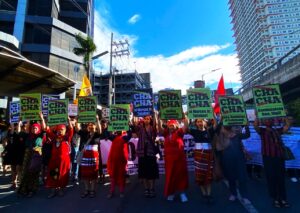
On Mar. 20, 2024, indigenous peoples (IPs) expressed their condemnation of the unnecessary Charter change contemplated by the House of Representatives by staging a protest at the Batasang Pambansa, joining other groups opposed to the Resolution of Both Houses No. 7 (RBH7) that seeks to amend the economic provisions of the 1987 Constitution.
Sandugo, Katribu and Panaghiusa Philippine Network (PPN) said RBH7 is designed to subvert the economic provisions of the 1987 Constitution, amending the charter by scrapping limitations on foreign ownership of public utilities, educational institutions and advertising companies. By inserting the phrase “unless otherwise provided by law,” Speaker Martin Romualdez, the House of Representatives will become superior to the Constitution as it can override the Basic Law and run roughshod over the three methods for instituting changes in the charter.
These methods are the constituent assembly, the constitutional convention and people’s initiative (PI), which bars politicians from meddling with the amendments that citizens want to institute, and these do not include the principal provisions of the Constitution. However, one cannot reasonably expect Congress to be truthful, honest and credible, virtues that have been dispensed with when the devil known as the supermajority took over common sense and civic duty in crafting legislation. In truth, these supermajorities have idiotized the legislative process and acted as puppets of presidents. As one former sensible journalist said in describing Congress, the lower house is lower than low, with its members signing documents in pitch dark and swallowing the guff of whoever occupies Malacanang and stumbling over each other in the dogpile to catch the biggest share of the pork barrel.
It is horribly strange that the proponents of Cha-cha, from Malacanang to the Lower House have not said a word how foreign countries would respond to the reciprocity requirement in amending the Charter. Since foreign countries would benefit from the amendments, their constitutions must likewise permit Filipino ownership of their public utilities, social services, universities and advertising agencies. Bigay ka nang bigay, wala ka namang napapala sa kanila. Kapag ganyan, unequal ang Cha-cha ni Romualdez. There is no such thing as a globalized Constitution that would apply to all countries. This is not case of a sauce for both goose and gander. The gratuitous Cha-cha for others is a gift for foreigners. It is the equivalent of the German word “Gift” to the IPs and all of us. In English, it means poison.
The IP organizations are correct in attacking Cha-cha because even without Cha-cha, they have become the victims of graft-ridden administrations. Take the case of the Kaliwa dam in Rizal and Quezon. The Duterte regime gifted China with the multi-billion project without securing the consent of the Dumagat and Remontados who have occupied the fastnesses of Rizal and Quezon as their ancestral land. Moreover, Chinese corporations did not even bother to secure a well-studied environmental compliance certificate (ECC) for the project. A recent report showed that a Japanese proposal was superior to the Chinese plan, with the interest on the loan more generous than Beijing’s interest rate, along with opaque terms that do not permit extensions on payments.
“We sense nothing but ill intent from the Marcos Jr. administration’s push to amend the Constitution to advance foreign corporate interests at the expense of people’s rights. Charter change will ultimately lead to the ethnocide of our people. The national government must instead refocus on promoting the rights of the IPs, protecting their ancestral lands, and prioritizing the welfare of the people. Instead of Charter change, we call for genuine agrarian reform and national industrialization,” Panghiusa argued.
Katribu and Sandugo noted that the choreographers of Cha-cha operetta want RBH7 to pass before the Holy Week break in order to inflict the Calvary on IPs. They noted that, as it is, current laws have already torpedoed the economic provisions of the 1987 Constitution by allowing 100% percent foreign ownership of renewable energy corporations, and this also applies to coal power plants. On paper, many plantations are purportedly Filipino-owned but controlled by foreign multinational corporations, and the situation is the same for mining corporations, many of whom borrow from the banking system instead of bringing in foreign direct investments.
Currently, the IPs are the most marginalized in terms of basic social services, having little to no access to clean water, electricity, health services, and education that is culturally-relevant. When they try to access health and education services, they face grave discrimination. When they built their own schools, they were tagged as terrorists, their schools were bombed, and their teachers were massacred. This dominant culture of discrimination and state neglect on IPs will worsen, as the proposal to charter change also opens education and media to 100% foreign ownership,” Panaghiusa warned. (DEO MAGNO)